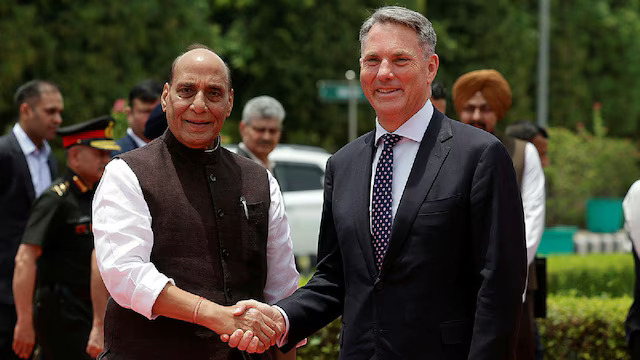India and Australia have unveiled a series of strategic initiatives to advance their defence cooperation, with a strong emphasis on cutting-edge submarine detection technology, maritime collaboration, and regional security in the Indo-Pacific. The announcements followed a high-level bilateral meeting between Indian Defence Minister Rajnath Singh and Australian Deputy Prime Minister and Defence Minister Richard Marles in New Delhi.
A key outcome of the dialogue was the launch of a joint project focused on submarine detection, aimed at enhancing undersea surveillance capabilities. With China ramping up its naval presence and deploying dual-use fishing fleets in sensitive waters, both nations see the need to counter growing maritime threats. India, which has been developing indigenous sonar systems through institutions like the Naval Science and Technological Laboratory (NSTL) since the 1970s, is expected to gain from Australia’s technological support and expertise.
In a further boost to operational synergy, India has offered Australia access to its advanced ship-repairing facilities, including Cochin Shipyard Limited. The shipyard’s state-of-the-art 6,000-ton ship lift system is poised to provide vital logistical support for Australian naval vessels operating in the Indian Ocean region. This initiative is part of broader efforts to create an integrated maritime support network between the two countries.
India will also join as an observer in an upcoming military exercise involving Australia and Papua New Guinea. This builds on previous cooperation through Exercise Austrahind, last held in Pune in 2024, which focused on tactical coordination and military-to-military exchange. These engagements are reflective of a shared commitment to safeguarding common interests across a volatile Indo-Pacific region.
Beyond collaboration, the dialogue also addressed sensitive geopolitical concerns. India advised Australia to remain cautious in its military interactions with Pakistan, citing the deep strategic alignment between Islamabad and Beijing. Indian officials highlighted concerns over real-time Chinese intelligence sharing through platforms like the J-10 fighter jets operated by Pakistan, especially in the context of the recent Kashmir conflict.
Additionally, India raised the issue of pro-Khalistan activities and their potential to affect bilateral relations. While details remain undisclosed, Indian authorities have consistently flagged the threat posed by separatist elements operating abroad.
The outcomes of the Singh-Marles meeting mark a significant deepening of India-Australia defence relations, reinforcing their roles as key players in ensuring peace, stability, and maritime security in the Indo-Pacific.













